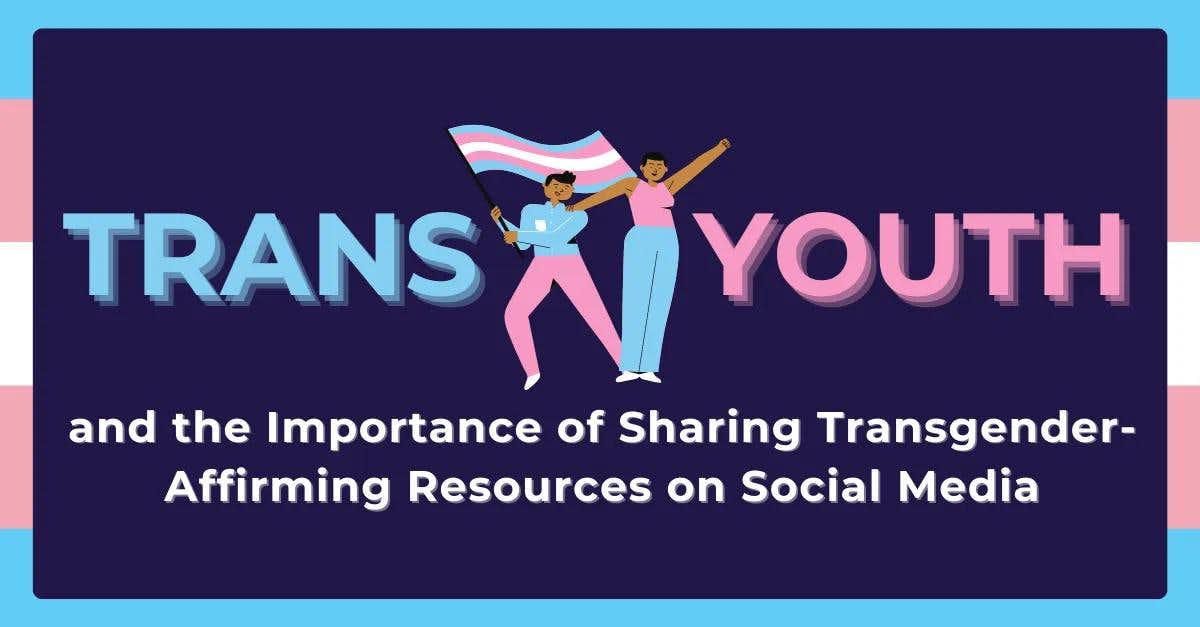November 21st, 2022

In 2021, 375 transgender people were murdered. The International Transgender Day of Remembrance has been observed annually on November 20th since 1999 and honors all those who have been killed due to hatred or transphobia. This day also brings important attention to the violence that has been committed against all those identifying as transgender.
Transgender youth have been extremely impactful in not only spreading awareness about the violence that their community faces, but sharing affirming resources and information. Social media has made it easier than ever before for this community to connect, but it also may come at a cost.

Social media is everywhere, and almost all teens have some social media presence. From Instagram to Snapchat to Twitter to TikTok to BeReal, there are so many opportunities to share.
Many trans youths rely on social media to find a community that they may be missing at school or in their local area. They may feel alienated from cisgender students or don’t feel comfortable sharing struggles for fear that they will be bullied or won’t be understood.
75% of trans youth don’t feel safe at school and are more likely to miss school due to concerns for their own personal safety. Many gender non-conforming students are blocked from getting the same schooling experience as gender-conforming peers by the administration and teachers.
59% of trans youth have been denied using a restroom that aligns with their gender identity. Can you imagine going to school or work, and not being allowed to use the restroom? Not only that but being punished. Trans youth have been banned from going on field trips due to the way that they dress, taking away from their education and learning.
So why dotrans youth use social media? To connect with others who are going through similar experiences, and share ways to advocate for their rights. Trans youth are using social media to spread resources and awareness within their community and with allies to help fight the transphobia that many face every day, at school and at home.
Pros:
Cons:

As referenced above, cyberbullying and aggression have a harmful impact on the mental health of trans youth. A recent study found that cyberbullying that transgender, non-binary, and gender-diverse people are one of the most victimized groups on social media. Those surveyed stated that most of the cyberbullying was done anonymously, and was both physically and sexually threatening. Cyberbullying has been linked to poor mental health and increased risk of suicide along with evoking negative emotions.
There is an essential need for you to support trans youth who are being bullied and speak out against those who are transphobic.
If you or someone else is experiencing transphobia online and having a mental health crisis, please call the Trevor Project’s crisis intervention and suicide prevention lifeline: 866-488-7386.
Trans youth need your support.
Here are some recent laws and actions that are providing roadblocks for trans youth:
What can you do to support trans youth?
This fight seems big, but your support will make a difference. We can donate to transgender-supportive charities, we can speak up when hearing hate speech or misinformation about trans youth, and we can share transgender-affirming resources on social media. We can support transgender influencers on social media, and share their stories with others.
Here are some great transgender Instagram influencers to support and follow:
On TikTok, you can find tons of transgender-affirming videos and resources using the hashtag, #transaffirmation.
Let's protect trans youth.
Written by: Bridget Brodlo, MA
At Clarity Clinic, we have highly trained staff who specialize in therapy and psychiatry services. To learn more about how we can support your mental health, call Clarity Clinic at (312) 815-9660 or schedule an appointment today.
Our Services
Virtual/Online CarePHP and IOPAdult PsychiatryChild & Adolescent PsychiatryAdult TherapyChild & Adolescent TherapyCouples CounselingFamily TherapyGroup TherapyPsychological TestingTranscranial Magnetic Stimulation (TMS)